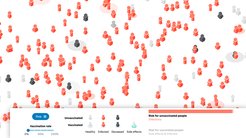Covid-19: Interactive risk communication formats can help overcome vaccine hesitancy
Study on the impact of different risk communication formats on the vaccine intentions of 1255 unvaccinated, vaccine-hesitant adults in Germany
Interactive risk communication formats can be more effective than conventional text-based formats in overcoming vaccine hesitancy and building public trust. These are the findings of a study conducted by researchers at Charité – Universitätsmedizin Berlin and the Max Planck Institute for Human Development in the context of Covid-19 vaccination. The study’s findings have been published in JAMA Network Open.

The Covid-19 pandemic has highlighted the vital role of vaccination in preventing life-threatening diseases and the collapse of health care systems. Yet the uptake of Covid-19 vaccination—and especially of booster shots—remains slow in many countries. Against this backdrop, every single person who overcomes vaccine hesitancy counts. Can new risk communication formats help to reach this group? In a study of 1255 unvaccinated, vaccine-hesitant adults, researchers at Charité – Universitätsmedizin Berlin and the Max Planck Institute for Human Development compared an interactive simulation of the benefits and harms of Covid-19 vaccination with a conventional text-based information format, and investigated the effects on participants’ vaccination intentions and benefit-to-harm assessments. “Unlike opponents of vaccination, people in the vaccine-hesitant group have not yet come to a final decision. They are characterized by a high need for information on the benefits and potential harms of vaccination, and may decide to get vaccinated if that information convinces them. Findings from cognitive science suggest that interactive simulations can be more effective than conventional text-based formats in this respect,” says principal investigator Odette Wegwarth, Heisenberg Professor at Charité – Universitätsmedizin Berlin and senior researcher at the Max Planck Institute for Human Development. Her main research focus is on risk literacy and risk communication in medical settings.
The vaccine-hesitant participants indeed responded better to the interactive simulation. Significantly more participants presented with an interactive simulation showed positive change in both vaccination intention and benefit-to-harm assessment than did those presented with the same information in a conventional text-based format. The net advantage of the interactive simulation over the text-based format was 5.3 percentage points for vaccination intention (9.8% vs. 4.5%) and 18.3 percentage points for benefit-to-harm assessment (25.3% vs. 7.0%).
Because the German government implemented mandatory Covid-19 vaccination for health care professionals from March 16, 2022—a measure that sparked widespread controversy—the researchers also investigated whether participants working in the health care sector responded differently to the intervention than the other participants. They found that the health care professionals in the sample were nearly twice as likely to show positive change in benefit-to-harm assessment after the intervention. However, they were only half as likely to show positive change in vaccination intention. This finding suggests that mandatory vaccination can lead to positions becoming entrenched, with negative implications for the willingness to get vaccinated. The study’s authors instead advocate for further investment in innovative, evidence-based risk communication concepts.
“Interactive simulations of risk information imitate the way people naturally learn about risk information—namely, by experiencing a sequence of events over time. This new form of risk communication seems to be more effective in prompting people to change their behavior than traditional text-based communication formats. In behavioral science, interventions of this kind are known as ‘boosts’, because they boost people’s decision-making competence,” says co-author Ralph Hertwig, Director of the Center for Adaptive Rationality at the Max Planck Institute for Human Development. In future pandemics, and in the domain of vaccine communication more broadly, interactive formats can be an important new tool for health authorities seeking to overcome vaccine hesitancy and build public trust.
The online study was conducted with 1255 adult residents of Germany at the peak of the Omicron wave in spring 2022. The participants had not yet received a Covid-19 vaccination and expressed indecisiveness about whether they would get vaccinated in the future. Participants were asked about their satisfaction with the German government’s Covid-19 containment measures, as well as for their subjective assessment of the benefit-to-harm ratio of Covid-19 vaccination. All participants were then presented with information on the age-adjusted absolute risks of infection, hospitalization, ICU admission, and death after exposure to the virus in 100,000 vaccinated vs. 100,000 unvaccinated individuals relative to the possible adverse effects of vaccination (e.g., myocarditis in men under 35 years). The presentation format varied: 651 participants saw a text-based description; 604 participants were presented with an interactive simulation.
Related Links:
- The interactive simulation used in the study: https://iwill-simulation.mpib-berlin.mpg.de
- The Science of Boosting website provides information on how boosting interventions can help people make better decisions: https://scienceofboosting.org/











